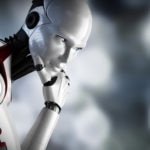Word Soup: Defining Robotic Process Automation, Intelligent Automation and Artificial Intelligence
With the proliferation of Artificial Intelligence (AI) applications across industries, there has been understandable confusion around associated terms, including Robotic Process Automation, Intelligent Automation and even AI itself.

To help clear up the confusion, read below for a short primer on what the three terms mean and how they can be - and are - used.
Is Robotic Process Automation the same as Intelligent Automation?
In a word, no. In several words, Robotic Process Automation, or RPA, is a part of intelligent automation, but not the same.
RPA is the form of automation that uses rules to perform a repetitive task. There is no intelligence to RPA as it does not make judgements on the data it is given. Instead, using RPA dictates that if X happens, it will do Y.
RPA is best used on repetitive tasks that are rules based, where putting RPA in place grants efficiency and standardization, and allows the humans to focus on higher-level thinking and processing.
So, what is Intelligent Automation?
According to Vik Renjen at Sutherland, intelligent automation is a more advanced form of RPA. In many intelligent automation processes, Renjen says, RPA solutions automate routine tasks, but also “leverage workflow to send intelligent automation process exceptions or cases that require complex decision-making to expert employees.” Once the exceptions are decisioned by a human, they are put back in the workflow to be processed by RPA. Intelligent automation thus saves valuable employee time when it comes to routine processes, but still uses human judgement for more complex issues, which in turn lowers risk for the company.
Renjen concludes that intelligent automation allows companies to better understand customer needs, improve customer satisfaction and get more insights, all of which leads to the potential for improved customer experience.
Finally, Artificial Intelligence.
BBVA Data & Analytics’ Edge team head José Antonio Rodríguez-Serrano says in “What is Artificial Intelligence” that AI is a field in computer science that focuses on the study and development of systems capable of performing tasks that are normally reserved for humans, like facial recognition, driverless cars or robots.
As this article points out, AI includes machine learning, natural language processing and facial recognition among its capabilities. Each technology requires mass amounts of data to feed its programs and make it smarter, so that it does not need human intervention - though, as we’ve seen with notable AI fails, AI has yet to be perfected for all applications. Even so, given AI’s relative intelligence, we can affirm that AI is not RPA, though RPA can be a part of AI, nor is it Intelligent Automation. Indeed, it’s smarter than either of those, requiring constant feeding (of data) and fine tuning.